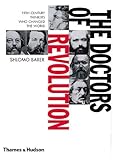The doctors of revolution : 19th-century thinkers who changed the world / Shlomo Barer.
By: Barer, Shlomo [author]
Language: English Publisher: New York, New York : Thames & Hudson, 2000Description: 1216 pages ; 26 cmContent type: text Media type: unmediated Carrier type: volumeISBN: 0500018847; 9780500018842Other title: 19th-century thinkers who changed the worldSubject(s): Marx, Karl, 1818-1883 | Social change -- Europe -- History -- 19th century | Philosophy, Modern -- 19th century | Socialism -- History -- 19th century | Anarchism -- History -- 19th century | Communism -- History -- 19th century | Europe -- Social conditions -- 19th century | Europe -- History -- 1789-1900DDC classification: 306.064 LOC classification: HN373 | .B34 2000| Item type | Current location | Home library | Call number | Status | Date due | Barcode | Item holds |
|---|---|---|---|---|---|---|---|
 BOOK
BOOK
|
COLLEGE LIBRARY | COLLEGE LIBRARY SUBJECT REFERENCE | 306.064 B237 2000 (Browse shelf) | Available | CITU-CL-38970 |
Browsing COLLEGE LIBRARY Shelves , Shelving location: SUBJECT REFERENCE Close shelf browser

|

|

|

|

|

|

|
||
| 306.01 B648 1997 Borrowed power : essays on cultural appropiation / | 306.01 In9 1996 In the company of others : perspectives on community, family, and culture / | 306.05 An784 2010 Annual editions : anthropology 10/11/ | 306.064 B237 2000 The doctors of revolution : 19th-century thinkers who changed the world / | 306.07 T22 1971 Teaching multi-cultural populationd : five heriages / | 306.0899915 H34 2000 Second nature : the history and implications of Australia as Aboriginal landscape / | 306.09 H537 1988 High points in anthropology / |
Includes index
Includes bibliographical references (p. 1206-1211)
Babeuf, Buonarroti and the "conspiracy of equals" --
From the imperial purveyor of coin and capital to Heine and Karl Marx --
Heine's childhood --
Tsar Alexander, young Harry Heine and Karl Marx's father --
The leaders of Europe after the Congress of Vienna; Heine in love; Saint-Simon and other utopians --
Heine's three universities --
The Decembrist Revolution that failed --
Fathers and sons: Herzen and Bakunin in their youth --
Heine adrift and rebuffed in 1828 --
The July revolution: Saint-Simon, Fourier and Buonarroti --
Heine begins his life in Paris --
Karl Marx in high school and the "conversion conflict" --
The romantic Russians in exile and the coup that failed in Paris --
Karl Marx's first student year in Bonn --
"The hand of God" on Bakunin --
Young Engels among the Pietists of the Wupper Valley --
Moses Hess and "the new philosophy" --
Marx the student in Berlin --
Marx and the influence of Hegel --
Heine and his tycoon uncle Salomon --
On the threshold of the "extraordinary decade" --
Heine's warning about communism and the struggle against the King of Prussia --
George Herwegh, "the iron lark of revolution"; Heine on Ludwig Bhorne --
Founding the Rheinische Zeitung --
Cultural divisions in Berlin and Paris --
Problems for Marx and the "bourgeois king" of France --
A red October scatters the budding doctors of revolution --
Bakunin falls in love with "the people" and Marx gets married --
Marx, Prometheus, and "Moses in search of a people" --
The "doctors" gather in Paris and Marx discovers the "proletariat" --
The relationship between the prophet of communism and the poet who foresaw its horrors --
Marx's work in Paris --
The "doctors" take up their positions for the coming revolution --
Ferdinand Lassalle and Heine's "inheritance war" --
1848: the making of the Communist manifesto --
The February revolution in Paris: "the madness of God" unleashed --
The dispersal of the doctors of revolution --
From "doctors" to Lenin.
"Nineteenth-century Europe was the scene of extraordinary upheaval. It was in this period that a number of philosophers, poets and artists sought to regain the revolutionary momentum - and it was their efforts that lay behind the establishment of socialism, anarchism and communism. The best-known of these thinkers was Karl Marx, self-appointed leader of the socialist movement that led in the next century to the Russian Revolution, Lenin and Stalin. But Shlomo Barer, the author of this study of obsessed agitators, also brings into the picture the greatest of German lyric poets and political commentator, Heinrich Heine; the hitherto obscure personality of Moses Hess, who may rank as the first communist of all; two Russians of aristocratic background who were prepared to throw over all their wealth and privilege to fight for social and economic change, Alexander Herzen and Michael Bakunin; and Ferdinand Lasalle, the young German firebrand who might have outclassed all the others had he not died young in a ridiculous duel." "Barer explores the childhood, education and young adulthood of these remarkable men, and presents in lively detail their families, their loves, their mistresses and wives, their friends, and the way their lives all crisscrossed. He also paints in the political and cultural background so that the Russian tsars and French kings are brought to life, not to mention such illustrious personalities as George Sand and her circle, Meyerbeer the opera composer, Ivan Turgenev, Balzac, Georg Herwegh and a host of others."--Jacket.

There are no comments for this item.